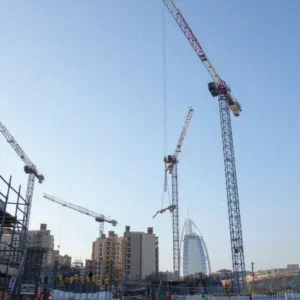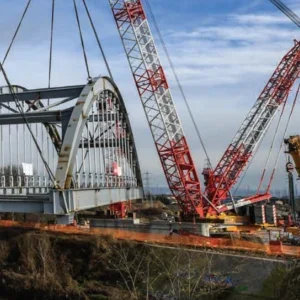Although Sarens’ history in the UK stretches back just fifteen years, the backbone of Sarens today is made up of what was Grayston, White and Sparrow, formerly one of the biggest crane rental firms in the country. G W Sparrow and Sons was formed in 1985 after being acquired by British Electric Traction.
Since Sarens purchased the heavy crane division of the firm in 1997 the business has continued to thrive, with much of its current workforce remaining since its Middlesborough site first opened roughly 30 years ago.
Many changes have occurred at Sarens UK over the years, with one of the more recent being the addition of general manager Jon Dailey to the fold nine months ago.
No stranger to the industry, Dailey had worked for rival firm Mammoet for a decade prior to his latest role, but his time in the construction industry stretches back even further with a role at Bechtel.
Having experienced the ebbs and flows of the industry in the UK, Dailey is well placed to comment on developments in the UK market for crawlers.
"Demand for the bigger machines has continued to grow and grow, especially 600t crawler cranes and above," says Dailey. "There seems to have been a marked increase in the last three or four years of people requiring cranes of that size. So we’ve now, since I came on board, just brought over to supplement the existing fleet the Terex CC8800, the CC 6800, four more CC 2800 Demags, and there’s a 500t Hitachi Sumitomo that’s just come in also. So either we’re doing a lot better or there are signs of increased activity on that size of machine."
Dailey believes this has been fuelled predominantly by the increasing demand for on and offshore renewable energy, with demand for higher capacity crawler cranes increasing along with the turbine heights and nacelle weights of wind turbines.
"Over the past three or four years there’s been a marked increase in the need for cranes of that size," continues Dailey. "The fleet at Sarens stayed relatively stable for the first ten years, they already had a good fleet of machines, and now they are bringing things in just recently where they’ve started to need bigger cranes. We were at risk of being over-expanded, so we’re investing to cover projects."
Due to the size of the company, for Sarens UK it has most often simply been a matter of transferring cranes from elsewhere in Europe to the UK when needed, although there have also been some new purchases to shore up the fleet.
And with the UK being a much smaller market for crawler cranes than in some parts of Europe, this is easier to accomplish.
"Compared to somewhere like the Netherlands, the UK is not as saturated. It’s selective work. We’re good at diversifying into different markets, so we do a lot of work for the offshore industry. They require large cranes to help, on a seasonal basis, with their offshore cable laying and other things.
"So we’re able to get into that market. We’re also able to go into nuclear. We’re also able to go into power generation and civil. We have pretty good leads into a lot of different markets and obviously the benefit for us is that if we’re quiet we can transfer equipment back to head office, and they move the equipment round to markets where it is busier than the UK, and vice versa. When we’re busy we can pull equipment out of a lot of other regions to come here. We have that flexibility where we don’t have to worry about it, we can bring a large number of machines in for a short term period, for say 12-18 months, and know we can move them somewhere else after that."
Demonstrating the ease with which the firm transports its cranes from market to market Dailey explains that one of the firm’s Terex CC 8800s is currently at work on a project for Burnt Island Fabricators, which delivers major fabrication projects for the oil and gas industry.
Once it has completed this job it will travel down from the fabrictaor’s Methil, located less than 50km from Edinburgh across the Firth of Forth, all the way to Port Talbot to support refurbishment works on a blast furnace. On again from here, it will be travel across the Channel back in to Europe for another job, although Dailey says the details can vary slightly as practicalities are worked out.
Having come from Mammoet, Dailey has found the culture at Sarens very different in terms of communication, in that in the past has meant the company has not been in the habit of widely publicising what they do. However with its 15-year milestone approaching, and to further increase the businesses workload, he feels it is high time it started.
"Part of the reason I was brought over is because we’re restructuring the group and they’re putting more emphasis on the global sales network, whereas in the past they were just literally relying on references they’re now actively pursuing work now and putting a team together to target these major projects globally to field these bigger cranes. Sarens as it is now would rather not just continue on relying on word of mouth, reputation and recommendations.
"There are people here who’ve been working here for 25-30 years or something like that. So it’s been around and about in the UK for a long time and it’s always been, during the days of G W Sparrow, it was always the main heavy lift company in the UK.
"At the time they were one of the biggest in the world for what they did and up through a sequence of events or something it’s led to the eventual buyout by Sarens and then creating Sarens UK 15 years ago."
To mark its anniversary, Sarens UK will host a charity golf tournament on 12th July, a charity race night, crane workshops on the 13th July and an open day to allow the local community and potential clients to come in and see it’s Teeside facilites.






